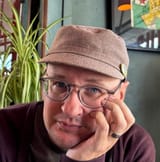Big Crime
no more great again
Leave it to Neil to write a new protest anthem and debut it in Chicago just as the current administration is threatening the Windy City. I'll say that this is his most successful foray into musical resistance in a long while, too. The song rips, the chorus is catchy and has that memorable elongated and very Neil "ceeee" going for it. Let's talk a little bit about Neil's history with protest songs and politics.
Even though Stephen Stills wrote it, we have to mention Buffalo Springfield's "For What It's Worth." Written in response to the Sunset Strip curfew riots of 1966, it's one of the most ubiquitous songs about resisting authority on the airwaves (despite it being frequently used to evoke anti-war sentiments). Neil's major contribution is the distinctive guitar harmonics that signal the song to come. An important part of protest anthems is that they need to be instantly recognizable as well as ear worms. Next, Neil joined the socially conscious David Crosby, Stephen Stills, and Graham Nash, penning the chilling "Ohio" in response to the May 4, 1970 protest in which Ohio National Guard shot at and killed students at Kent State University. It was recorded immediately after writing and released within a few weeks. Very similar to how Neil wrote "Big Crime" and debuted it a day or two later while on tour. Songs are most relevant when they speak to the current time, and not just a comment on past events.
After the Gold Rush's title song is one of the earliest environmentalist messages, but Neil caused a bit of a ruckus with the extremely vivid "Southern Man" (kicking off an infamously friendly spat that would get him literally name checked in a perennial radio staple). While topical, "Southern Man" isn't quite a protest song, meaning that it wasn't about a specific event or news of the day, but it was a big deal for an artist of Neil's notoriety to so bluntly call out pervasive racism. Likewise with the similar "Alabama" on Harvest. Neil next took on big oil in "Vampire Blues" and Nixon in "Ambulance Blues" then delved back into Vietnam with "Lookout Joe."
The late 70s and 80s were a journey for Neil and his political forays were not so much protests but commentaries. However, "This Note's For You" could certainly be considered a protest song, with the target being corporate greed and artists who take the money. I wrote an entire essay about "Rockin' in the Free World," which has become Neil's most enduring and well-known protest anthem, despite people not really understanding it. The Smell the Horse tour (and Weld) should be considered a "protest tour" with its evocation of the Gulf War through Hendrix and Dylan (the large yellow ribbon on the mic stand and bomb blast sound effects created quite an experience).
When Neil's political thoughts surfaced again, it was about abortion on Mirror Ball. "Song X" and "Act of Love" both tackle the topic without precisely being protest songs. He approached his growing unease with George W. Bush's American on Greendale, but it really took until 2006 for Neil to seriously try to protest through music again...and then he really went for it. Living With War is an entire anti-war album that tried hard to create catchy songs about the perils of war. His ensuing tour with CSNY was all-in on the protest angle, to the dismay of many people looking for a pleasant evening with aging folk singers (see the documentary CSNY/Déjà Vu for more).
The first album with Promise of the Real, Monsanto Years, is another entire protest album, this time focused around factory farming and pesticides. He follows it up with the strange Earth live album to continue his environmental message. Peace Trail has the distinction of being recorded during the 2016 election and seeing the tragedies to come, starting with the Standing Rock pipeline protests that he participated in. The next album with Promise of the Real, The Visitor, contained quite a few protest songs, including "Stand Tall" and "Children of Destiny," songs that attempted to protest the Trump administration, but ultimately pulled their punches.
One of Neil's best protest songs is unfortunately one of his least known and least played (literally performed once). "Truth Kills" was recorded January 31, 2019 on the solo tour before going into the studio with Crazy Horse for Colorado. It didn't make the album but appeared as a b-side. He gets right to the heart of the war on truth and calls Trump out directly.
I don't want to be great again
First time was good enough
Truth kills in a world of lies
So I'll be speaking up
Don't want to be great again
Aside from the small live collection, The Times, and a video update of "Shut It Down" for Covid, Neil skipped musical comments on the Trump administration until his latest album, Talkin' to the Trees. Like I alluded to at the beginning, these are not particularly successful. So hearing a directly political song debuted in the midst of an American tour is a big act. He gets the chance to play it directly to crowds. Perhaps his appearance at the Fighting Oligarchy rally in LA with Bernie Sanders and Alexandria Ocasio-Cortez spurred him to be more direct.
"Big Crime" is certainly an improvement on the nebulous "Big Change," which was the first thing we heard from the album preceding the current tour. It didn't really take a side. And frankly you have to take a side right now or everything will be lost. Is this the best song for the moment? Nope, of course not, but it's got a hook, it takes a stand, and skewers Trump with the idiosyncratic "big crime" identifier. Plus, Neil lets loose a new Old Black solo and that's always a treat. Let's hope Old Black kills fascists.

